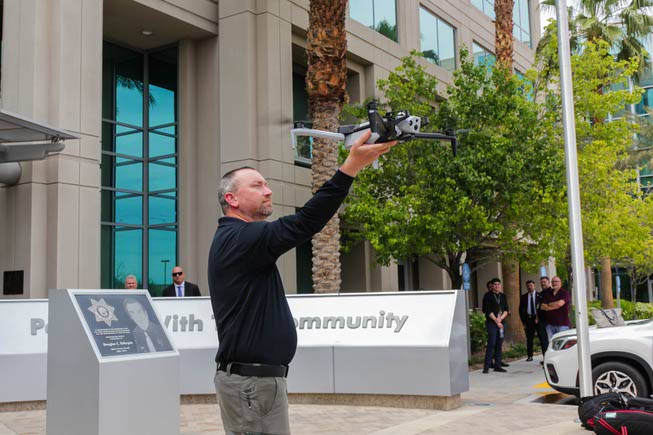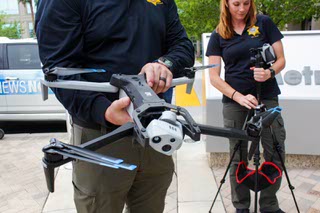
Gregory Stevens, Metro Detective, reaches out to grab the drone after a demonstration flight at the LVMPD Headquarters in Las Vegas, Nevada on Thursday, April 18, 2024.
Friday, April 19, 2024 | 2 a.m.
Metro Police will start a pilot program to deploy surveillance drones more frequently alongside officers, department officials said Thursday, to increase safety of both authorities and Las Vegas residents.
The program, known as the Mobile Drones as a First Responder, or Mobile DFR, was introduced by Metro Deputy Chief Dori Koren at a news conference Thursday at Metro Headquarters. The department will begin deploying Mobile DFR-designated vehicles equipped with drones that will be able to respond to emergency situations and deploy drones immediately, somewhat similar to how Metro’s K9 patrol vehicles operate.
“No matter what neighborhood you live in, no matter what area, if there is a violent crime, if there is a major incident that is threatening our community members, we have this capability to be able to respond quickly, deploy these types of assets and help enhance the safety in that area,” Koren said.
The drones will primarily be used in environments that are more difficult or dangerous for officers to access, such as search and rescues, SWAT threat assessments and event surveillance, Koren said.
None of the drones are automated but are flown with large controllers by drone pilots with the department. To fly the drones, Metro officers are required to receive a Remote Pilot Certificate from the Federal Aviation Administration and undergo specialized training from Metro officials.
Although Metro is instituting the Mobile DFR program to further integrate the technology into its operations, Metro Police’s first use of drone technology came in the wake of the Oct. 1, 2017, mass shooting, according to the Metro Police website. Since then, the department has mostly utilized the drones for SWAT operations and for surveillance at major events like the Formula One race.
Metro has used drones at least 94 times this year, according to data from the department’s website.
Metro Police currently use four types of drones equipped with a variety of tools designed to assist law enforcement, according to the department’s website. The drones have technology ranging from 4k cameras for reconnaissance to microphones allowing police to communicate with suspects remotely.
The Mobile DFR vehicles will primarily carry Skydio X10 drones, which come equipped with several cameras including thermal vision, and can achieve a maximum speed of 45 mph, according to the manufacturer’s website. The X10 drones are not currently listed as in-use on Metro’s website.
Koren emphasized that privacy and transparency were both critical elements Metro considered in instituting the drone program. The drones are prohibited from recording or transmitting images where residents would have “reasonable expectation of privacy,” except when permitted by warrants or in emergency situations, according to Metro’s website.
Metro officials met with the Departments of Justice and Homeland Security to complete a comprehensive evaluation of the Mobile DFR program.
“It is critically important, it will always be critically important, for us to ensure that another priority is the privacy, civil rights, civil liberties of our community that we serve, and the transparency that we intend and that we have done,” Koren said.
None of Metro Police’s drones are equipped with any kind of weapons, Koren said.
Currently, Metro provides the flight data for its drones online, allowing the public to see when drones are used and their flight paths during deployment. Some flight records also indicate the specific case or crime for which the drone was used. Metro Police does not release the flight data for covert operations or open investigations, according to its website.
Koren refused to state how many drones the department currently has, but said Metro was looking to expand its arsenal further.
“Right now we have several, but we’re looking at having dozens,” Koren said.
Koren said the department was also experimenting with the use of drone “dogs,” which are four-legged drones commonly used by law enforcement. Boston Dynamics, which manufactures the popular “Spot” drone dog, reported there are more than 1,000 of its robots operating in 35 different countries. Last May, Los Angeles City Council approved use of the machines.
Koren did not specify a date for the launch of the Mobile DFR program, but said the pilot program would start soon with a single drone-equipped vehicle.
[email protected] / 702-990-8926 / @a_y_denrunnels

